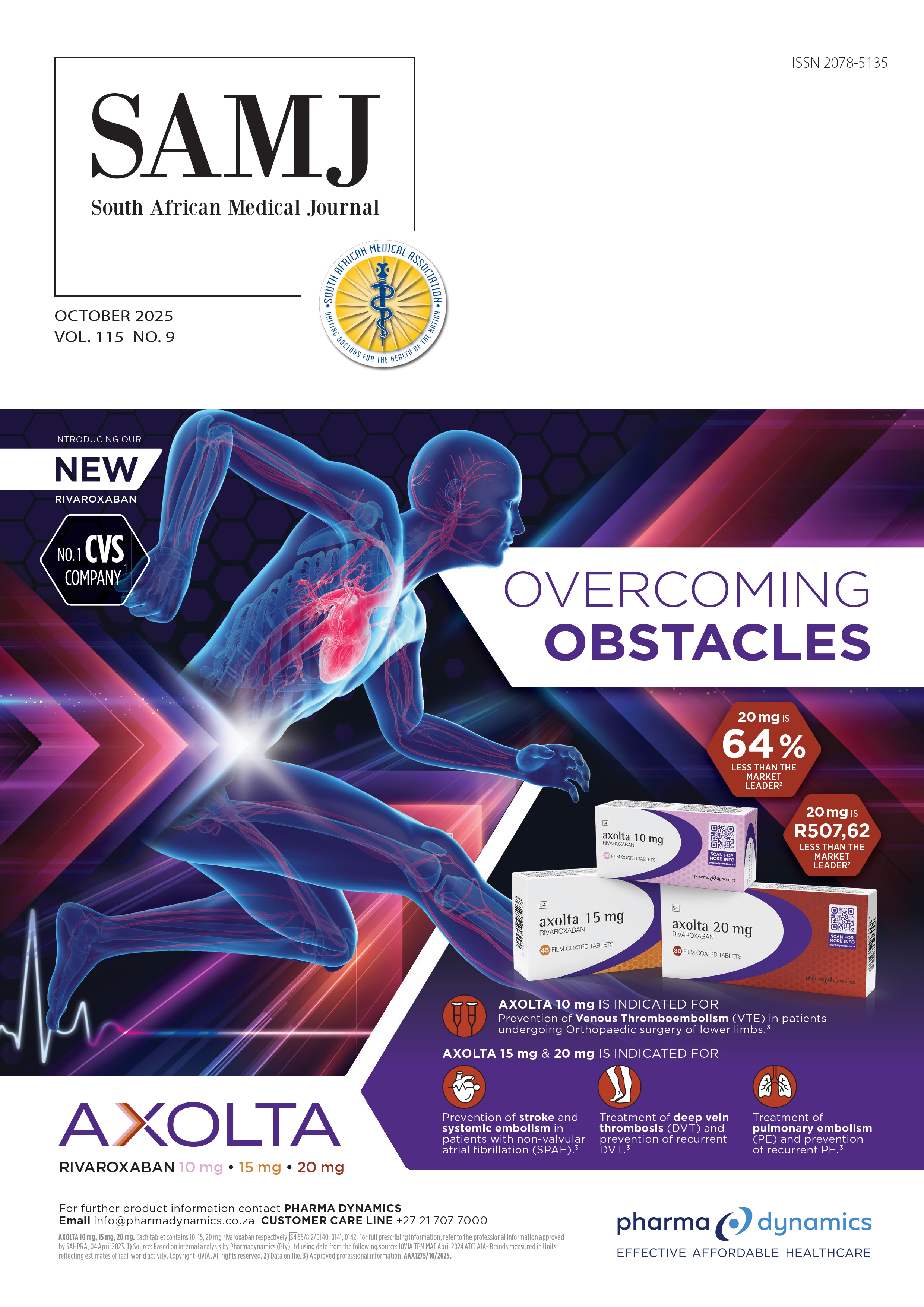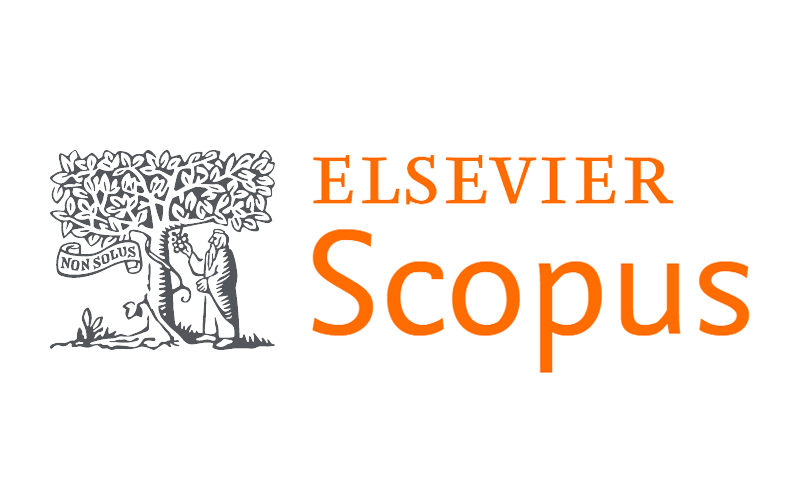A cross-sectional study of patients with prosthetic mitral valves at a tertiary centre in Johannesburg, South Africa
DOI:
https://doi.org/10.7196/Keywords:
cardiology, valvulopathy, heart faiure, Cardiothoracic surgeryAbstract
Background. There is a high incidence of rheumatic valvular heart disease involving the mitral valve in Soweto, Johannesburg. Many of these patients go on to have mitral valve replacement (MVR). Data regarding clinical and echocardiographic characteristics of patients with prosthetic mitral valves are scarce in South Africa.
Objective. To document the clinical and echocardiographic profiles of contemporary patients with MVR.
Methods. Clinical, electrocardiographic and echocardiographic data in these patients were collected prospectively from March 2020 to August 2021 at Chris Hani Baragwanath Academic Hospital prosthetic valve clinic.
Results. The study included 186 participants with a median (interquartile range (IQR)) age of 52 (41 - 60) years. Of these, 96% were of black African ethnicity (79% female). The median (IQR) body mass index (BMI) among participants was 27 (23.5 - 30.4) kg/m2, with 29% of participants classified as obese (BMI >30 kg/m2). Eighty-two percent of patients had New York Heart Association class 1 dyspnoea. The most common complications were atrial fibrillation (AF, 39%), heart failure (HF, 25%) and stroke (13%). There were two cases of previously documented prosthetic valve thrombosis, two cases of prosthetic valve endocarditis, two of paravalvular regurgitation and one with structural valve deterioration. Seventy percent of patients had subtherapeutic international normalised ratios (INRs), with a median (IQR) INR of 2.55 (2.03 - 2.92). Forty-seven percent of patients had a left ventricular ejection fraction (EF) of <40%. Seventy-four percent of participants were on some combination of guideline-directed medical therapy for HF with reduced EF, although only 12% were on at least three medications. Pulmonary hypertension was present in 37% of patients, with a median (IQR) pulmonary artery systolic pressure of 28.5 (17 - 41) mmHg. Tricuspid annuloplasty ring was noted in a minority (12 patients).
Conclusion. The contemporary patients with MVR were middle-aged obese females with significant AF burden, residual left ventricular dysfunction that was suboptimally managed, and subtherapeutic INR.
References
1. Sliwa K, Carrington M, Mayosi BM, Zigiriadis E, Mvungi R, Stewart S. Incidence and characteristics of newly diagnosed rheumatic heart disease in urban African adults: Insights from the heart of Soweto study. Euro Heart J 2010;31(6):719-727. https://doi.org/10.1093/eurheartj/ehp530
2. Meel R, Peters F, Libhaber E, Essop MR. The changing spectrum of rheumatic mitral regurgitation in Soweto, South Africa. Cardiovascular J Africa 2017;28(4):215-220. https://doi.org/10.5830/CVJA- 2016-086
3. Meel R, Essop MR. Striking increase in the incidence of infective endocarditis associated with recreational drug abuse in urban South Africa. S Afr Med J 2018;108(7):585-589. https://doi. org/10.7196/SAMJ.2018.v108i7.13007
4. Pecoraro AJ, Doubell AF. Infective endocarditis in South Africa. Cardiovasc Diagn Ther 2020;10(2):252-261. https://doi.org/10.21037/cdt.2019.06.03
5. De Villiers MC, Viljoen CA, Manning K, et al. The changing landscape of infective endocarditis in South Africa. S Afr Med J 2019;109(8):592-596. https://doi.org/10.7196/SAMJ.2019.v109i8.13888
6. Moloi AH, Watkins D, Engel ME, Mall S, Zühlke L. Epidemiology, health systems and stakeholders in
rheumatic heart disease in Africa: A systematic review protocol. BMJ Open 2016;6(5):e011266. https://
doi.org/10.1136/bmjopen-2016-011266
7. Pibarot P, Dumesnil JG. Prosthetic heart valves. Circulation 2009;119(7):1034-1048. https://doi.
org/10.1161/CIRCULATIONAHA.108.778886
8. Durko AP, Head SJ, Pibarot P, et al. Characteristics of surgical prosthetic heart valves and problems around labelling: A document from the European Association for Cardio-Thoracic Surgery (EACTS) – The Society of Thoracic Surgeons (STS) – American Association for Thoracic Surgery (AATS) Valve Labelling Task Force. Euro J Cardio-Thoracic Surg 2019;55(6):1025-1036. https://doi.org/10.1093/ ejcts/ezz034
9. Garver BA, Kaczmarek RG, Silverman BG, Gross TP, Hamilton PM. The epidemiology of prosthetic heart valves in the United States. Tex Heart Inst J 1995;22:86-91.
10. Zoghbi WA, Chambers JB, Dumesnil JG, et al. Recommendations for evaluation of prosthetic valves with echocardiography and Doppler ultrasound. J Am Soc Echocardiography 2009;22(9):975-1014. https://doi.org/10.1016/j.echo.2009.07.013
11. Vahanian A, Beyersdorf F, Praz F, et al. 2021 ESC/EACTS guidelines for the management of valvular heart disease. Euro Heart J 2021;43(7):561-632.
12. Otto CM, Nishimura RA, Bonow RO, et al. 2020 ACC/AHA guideline for the management of patients with valvular heart disease: A report of the American College of Cardiology/American Heart Association Joint Committee on Clinical Practice Guidelines. Circulation 2021;143(5):e35-e71. https:// doi.org/10.1161/CIR.0000000000000923
13. World Health Organization. Haemoglobin concentrations for the diagnosis of anaemia and assessment of severity. Geneva: WHO, 2011. http://www.who.int/vmnis/indicators/haemoglobin (accessed 15 February 2023).
14. McDonagh TA, Metra M, Adamo M, et al. 2023 Focused update of the 2021 ESC guidelines for the diagnosis and treatment of acute and chronic heart failure. Euro Heart J 2023;44(37):3631-3634. https://doi.org/10/1093/eurheartj/ehad195
15. Banderker E, Roozen G, Tsitsi M, Meel R. A cross-sectional study of the spectrum, aetiology and clinical characteristics of adult mitral valve disease at Chris Hani Baragwanath Academic Hospital. Cardiovasc J Africa 2023;34:1-7. https://doi.org/10.5830/cvja-2023-009
16. Tabane TMM, Leonard T, Kleyenstuber T. Peri-operative outcomes of mitral valve surgery at Charlotte Maxeke Johannesburg Academic Hospital. SA Heart 2021;18(2):118-125. https://doi.org/10.24170/18- 2-4884
17. Bonnet V, Boisselier C, Saplacan V, et al. The role of age and comorbidities in postoperative outcome of mitral valve repair. Medicine 2016;95(25):e3938. https://doi.org/10.1097/MD.0000000000003938
18. Movahed MR, Ahmadi-Kashani M, Kasravi B, Saito Y. Increased prevalence of mitral stenosis in women. J Am Soc Echocardiography 2006;19(7):911-913. https://doi.org/10.1016/j.echo.2006.01.017
19. Pasca I, Dang P, Tyagi G, Pai RG. Survival in patients with degenerative mitral stenosis: Results from a large retrospective cohort study. J Am Soc Echocardiography 2016;29(5):461-469. https://doi. org/10.1016/j.echo.2015.12.012
20. Mantovani F, Clavel M, Michelena HI, Suri RM, Schaff HV, Enríquez-Sarano M. Comprehensive imaging in women with organic mitral regurgitation. JACC Cardiovasc Imaging 2016;9(4):388-396. https://doi.org/10.1016/j.jcmg.2016.02.017
21. Gradidge PJL, Crowther NJ. Review: Metabolic syndrome in black South African women. Ethnicity Dis 2017;27(2):189. https://doi.org/10.18865/ed.27.2.189
22. South African National AIDS Council. HIV/AIDS and STD strategic plan for South Africa 2000 - 2005. Pretoria: National Department of Health, 2000. https://sanac.org.za/wp-content/uploads/2019/02/ NSP-2000-2005.pdf (accessed 25 May 2025).
23. Zilla P, Human P, Pennel T. Mechanical valve replacement for patients with rheumatic heart disease: The reality of INR control in Africa and beyond. Front Cardiovasc Med 2024;11. https://doi. org/10.3389/fcvm.2024.1347838
24. Roth GA, Mensah GA, Johnson CO, et al. Global burden of cardiovascular diseases and risk factors, 1990 - 2019: Update from the GBD 2019 study. J Am Coll Cardiol 2022;76(25):2982-3021. https://doi. org/10.1016/j.jacc.2020.11.010
25. Ntlokotsi S, Moshesh MF, Mntla P, Towobola OA, Mogale M. Optimum INR intensity and therapeutic INR control in patients with mechanical heart valve prosthesis on warfarin oral anticoagulation at Dr George Mukhari academic hospital: A three-year retrospective study. S Afr Fam Pract 2018;60(6):192-196. https://doi.org/10.4102/safp.v60i6.4927
26. Alphonsa A, Sharma KK, Sharma G, Bhatia R. Knowledge regarding oral anticoagulation therapy among patients with stroke and those at high risk of thromboembolic events. J Stroke Cerebrovasc Dis 2015;24(3):668-672. https://doi.org/10.1016/j.jstrokecerebrovasdis.2014.11.007
27. Oldgren J, Healey JS, Ezekowitz M, et al. Variations in cause and management of atrial fibrillation in a prospective registry of 15 400 emergency department patients in 46 countries: The RE-LY Atrial Fibrillation Registry. Circulation 2014;129(15):1568-1576.
28. Schapkaitz E, Jacobson BF, Becker P, Conway G. Thrombo-embolic and bleeding complications in patients with mechanical valve replacements – a prospective observational study. S Afr Med J 2006;96(8):710-713. https://pubmed.ncbi.nlm.nih.gov/17019493/ (accessed 22 May 2024).
29. Kistan D, Booysen M, Alexander G, Madiba TE. A South Africa tertiary centre experience with redo mitral valve replacement. S Afr J Surg 2022;60(1):44-48. https://doi.org/10.17159/2078-5151/2022/ v60n1a3192
30. Jatene MB, Marcial MB, Tarasoutchi F, Cardoso RA, Pomerantzeff P, Jatene AD. Influence of the maze procedure on the treatment of rheumatic atrial fibrillation – evaluation of rhythm control and clinical outcome in a comparative study. Euro J Cardio-thoracic Surg 2000;17(2):117-124. https://doi. org/10.106/s1010-7940(00)00326-2
31. Baumgartner H, Falk V, Bax JJ, et al. 2017 ESC/EACTS guidelines for the management of valvular heart disease. Euro Heart J 2017;38(36):2739-2791.
32. Barlow JB. Aspects of mitral and tricuspid regurgitation. J Cardiol Suppl 1991;25:3-33. https://pubmed. ncbi.nlm.nih.gov/1888464/ (accessed 16 July 2024).
33. Antunes MJ, Barlow JB. Management of tricuspid valve regurgitation. Heart 2005;93(2):271-276.
34. Suri RM, Schaff HV, Dearani JA, et al. Determinants of early decline in ejection fraction after surgical
correction of mitral regurgitation. J Thoracic Cardiovasc Surg 2008;136(2):442-447.
35. Mkoko P, Cupido BJ, Hitzeroth J, Chin A, Ntsekhe M. Profile, presentation and outcomes of prosthetic valve endocarditis in a South African tertiary hospital: Insights from the Groote Schuur Hospital Infective Endocarditis Registry. S Afr Med J 2022;112(4):288. https://doi.org/10.7196/SAMJ.2022.
v112i4.16146
Downloads
Published
Issue
Section
License
Copyright (c) 2025 P Sumaraj, R Meel

This work is licensed under a Creative Commons Attribution-NonCommercial 4.0 International License.
Licensing Information
The SAMJ is published under an Attribution-Non Commercial International Creative Commons Attribution (CC-BY-NC 4.0) License. Under this license, authors agree to make articles available to users, without permission or fees, for any lawful, non-commercial purpose. Users may read, copy, or re-use published content as long as the author and original place of publication are properly cited.
Exceptions to this license model is allowed for UKRI and research funded by organisations requiring that research be published open-access without embargo, under a CC-BY licence. As per the journals archiving policy, authors are permitted to self-archive the author-accepted manuscript (AAM) in a repository.
Publishing Rights
Authors grant the Publisher the exclusive right to publish, display, reproduce and/or distribute the Work in print and electronic format and in any medium known or hereafter developed, including for commercial use. The Author also agrees that the Publisher may retain in print or electronic format more than one copy of the Work for the purpose of preservation, security and back-up.





